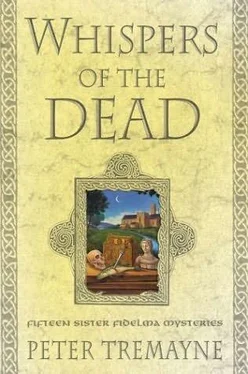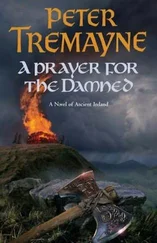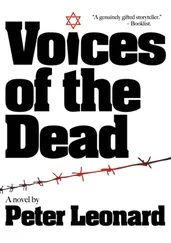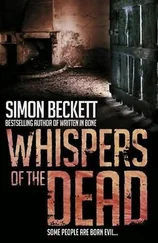Peter Tremayne - Whispers of the Dead
Здесь есть возможность читать онлайн «Peter Tremayne - Whispers of the Dead» весь текст электронной книги совершенно бесплатно (целиком полную версию без сокращений). В некоторых случаях можно слушать аудио, скачать через торрент в формате fb2 и присутствует краткое содержание. Жанр: Исторический детектив, на английском языке. Описание произведения, (предисловие) а так же отзывы посетителей доступны на портале библиотеки ЛибКат.
- Название:Whispers of the Dead
- Автор:
- Жанр:
- Год:неизвестен
- ISBN:нет данных
- Рейтинг книги:4 / 5. Голосов: 1
-
Избранное:Добавить в избранное
- Отзывы:
-
Ваша оценка:
- 80
- 1
- 2
- 3
- 4
- 5
Whispers of the Dead: краткое содержание, описание и аннотация
Предлагаем к чтению аннотацию, описание, краткое содержание или предисловие (зависит от того, что написал сам автор книги «Whispers of the Dead»). Если вы не нашли необходимую информацию о книге — напишите в комментариях, мы постараемся отыскать её.
Whispers of the Dead — читать онлайн бесплатно полную книгу (весь текст) целиком
Ниже представлен текст книги, разбитый по страницам. Система сохранения места последней прочитанной страницы, позволяет с удобством читать онлайн бесплатно книгу «Whispers of the Dead», без необходимости каждый раз заново искать на чём Вы остановились. Поставьте закладку, и сможете в любой момент перейти на страницу, на которой закончили чтение.
Интервал:
Закладка:
Declan had guided her to a seat among the rows of witnesses. These were the religious, lawyers and historians who were not part of the derbfine but who were the observers of the event and bore witness to the legality of its proceedings. Declan left her, as he had to see about the preparations, exiting the hall through a side door.
The great hall, lit by flickering torches and lamps, smoky and hot, seemed packed. There were at least three generations of Cúan’s family there, predominantly the male members. There were several women there, it was true, and prominent among them, seated to one side, was a tall, austere woman, with a sharp face and dark eyes. Fidelma had already met Berrach, who had come from the neighboring clan of the Déices. She was attending out of courtesy, but not because she had any public voice in the election of an heir to her husband, for a woman belonged to the derbfine of her father and not of her husband.
It was rare that a woman was elected to chieftainship or king-ship. This was not because women were excluded from office because the law gave equal status to women. In fact, only one woman had ever become High “King” of the five kingdoms of Éireann. Fidelma learnt this from the ancient king lists. But there were several tribes who not only elected women as chieftains but as military leaders. The female heir-apparent, the banchomarba, appeared usually when there was no acceptable male heir. Because the social system was based on the clan, female succession might lead to the alienation of the title and lands of the clan by marriage with people from another clan.
Fidelma knew that the Cáin Lánamna law text stipulated that the inheritance of a title or office, and especially inheritance of land, could only be used for the life of the female and then it had to revert to her father’s family. Any movable property could go to her husband and children even if outside the clan but land had to remain within the clan. This was so that the clan could protect its chieftain-ship and its territory. A female chief or king could not, therefore, nominate one of her own children as heir-apparent to her title as it had to remain with her father’s derbfine . It was not so long ago, Fidelma recalled, that the Brehon, Sencha mac Ailella, had given a wrongful judgment on female rights regarding this very matter and a female Brehon, Brígh Briugaid, had, on appeal, corrected it.
Fidelma suddenly awoke from her reverie to find that Declan had entered the hall and made his way across to where a group of the more elderly of the derbfine was seated. He looked serious and paused before one man, who stood up to speak with him face-to-face. Even at the angle from which she was observing, Fidelma could see that he was remarkably like Cúan, except that he was younger and bore deep lines on his face and had a weather-beaten took. The exchange, which Fidelma could not hear, appeared to be curt and hardly one of friendship. Declan then turned, and seemed to trip and stumble, colliding with the man. He caught himself and obviously apologized, without enthusiasm, before leaving the hall again.
A moment later Declan reappeared, leading into the hall Cúan, the chief of the Uí Liatháin. The stocky, red-bearded chieftain took his seat. At his right-hand side sat the handsome young man she knew to be Talamnach, smiling and looking confident. An attendant, following them, brought in two mugs of mead and placed them on a table standing between the chief and his nominee. Fidelma glanced to where Berrach was sitting. The woman was scowling but staring straight ahead. Nearby she noticed Berrach’s son Augaire was sprawled in his seat. He was about nineteen and Fidelma could see how Declan’s description of him as a weak, indolent youth seemed apt. He seemed totally uninterested in the proceedings.
Declan, as Cúan’s Brehon and advisor, had taken his place, standing at the chief’s side, and began to call for order.
“The matter that brings us here today is a simple one. It is to elect the heir-apparent to Cúan, chief of the Uí Liatháin.” He turned to Cúan. “Is there a nominee?”
The chief rose from his seat.
“I nominate, as my successor, Talamnach,” he announced and re-seated himself.
“Does Talamnach accept this nomination?”
The young man rose and smiled.
“I do.”
“Is there any here that will speak out against Talamnach?” intoned Declan in formal manner, still following the ancient ritual.
“There is!”
All eyes turned to the elderly man who had risen in the hall. Fidelma realized it was the man seated next to the one whom Declan had spoken to earlier. Fidelma suppressed a smile. Declan had obviously been making sure that there were no surprises by ensuring that he had foreknowledge of them. He had always been like that, even at the college run by the Brehon Morann where they had both studied for eight years. Indeed, some fellow students had whispered that Declan was too fond of making sure he knew the answers before the questions were asked. She shook her head and turned to listen to the man who had risen.
“I am Illan of Cluain Mult, cousin to Cúan and to his brother Bressal-father of Talamnach-and to their brother Selbach. I claim, as member of the first generation of this derbfine the right of challenge.”
There was no surprise expressed by either Cúan or Talamnach, who continued smiling though somewhat fixed in expression. Nor was there any consternation among those gathered. It was clear that this was the “trouble” that Brehon Declan had prophesied and which everyone was expecting.
“State your challenge, Illan of Cluain Mult,” intoned Declan in almost a monotone.
“My challenge is that there is one among us who is more fitted to be the heir-apparent, one who is filled with wisdom, who has traveled beyond our borders and seen the ways of other peoples. He has returned from his self-imposed exile among those of our people who migrated in recent centuries to the land called Kernow, settling there as our cousins, the Déices, did when they sailed to the kingdom of Dyfed. He brings temperance, knowledge and wisdom.”
“And his name?”
“His name is well known among us for it is my cousin, brother to Cúan-the man I nominate is Selbach. He sits at my side.”
“Stand, Selbach, and say if you accept the nomination.”
The elderly man Declan had earlier spoken to now stood.
“I do.”
Brehon Declan stood for a moment looking at the silent audience in the hall.
“Are there any other challenges or nominations?”
Fidelma saw that he was glancing toward the group surrounding Augaire. They were young men, arrogant, and whose glances showed that they were taking their cue from Augaire. Fidelma saw Augaire frown at his companions and shake his head quickly.
“If none,” went on Declan,“than we must proceed with the debate on the rival nominees.”
There was a silence.
“It behooves each nominee to make statements on their merits and attitudes for being considered,” Declan announced. “We must start with the first nominee, Talamnach, for he has been chosen by Cúan, our chief.”
Talamnach rose slowly. He still wore his smile of confidence.
“You all know me and must judge of yourselves what my merits are. You know that they satisfy our great chief, Cúan. The test of a great leader, as Cúan undoubtedly is, is that he leaves behind him an heir who has the determination and ability to continue his achievements. I believe that I am such an heir. Cúan commanded wisely and was, therefore, obeyed cheerfully. He had no need to lead but was content to point the way-and in that fact lay the greatness of his leadership. But he always accepted the responsibility in all things-he would say ‘I am in error’; he would never say ‘my followers were in error’-that, again, is the mark of great leadership. .”
Читать дальшеИнтервал:
Закладка:
Похожие книги на «Whispers of the Dead»
Представляем Вашему вниманию похожие книги на «Whispers of the Dead» списком для выбора. Мы отобрали схожую по названию и смыслу литературу в надежде предоставить читателям больше вариантов отыскать новые, интересные, ещё непрочитанные произведения.
Обсуждение, отзывы о книге «Whispers of the Dead» и просто собственные мнения читателей. Оставьте ваши комментарии, напишите, что Вы думаете о произведении, его смысле или главных героях. Укажите что конкретно понравилось, а что нет, и почему Вы так считаете.












